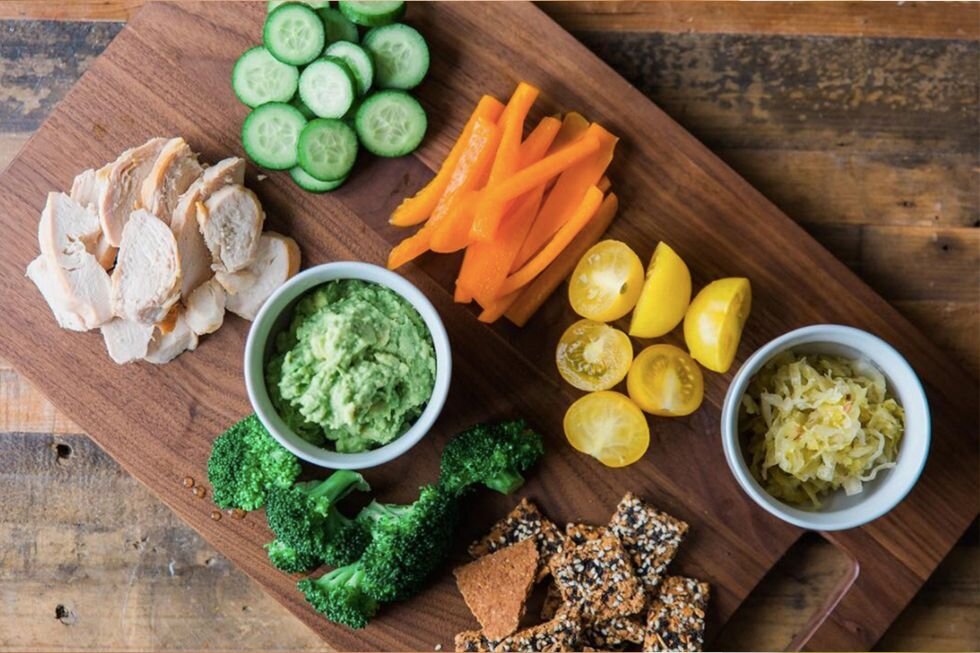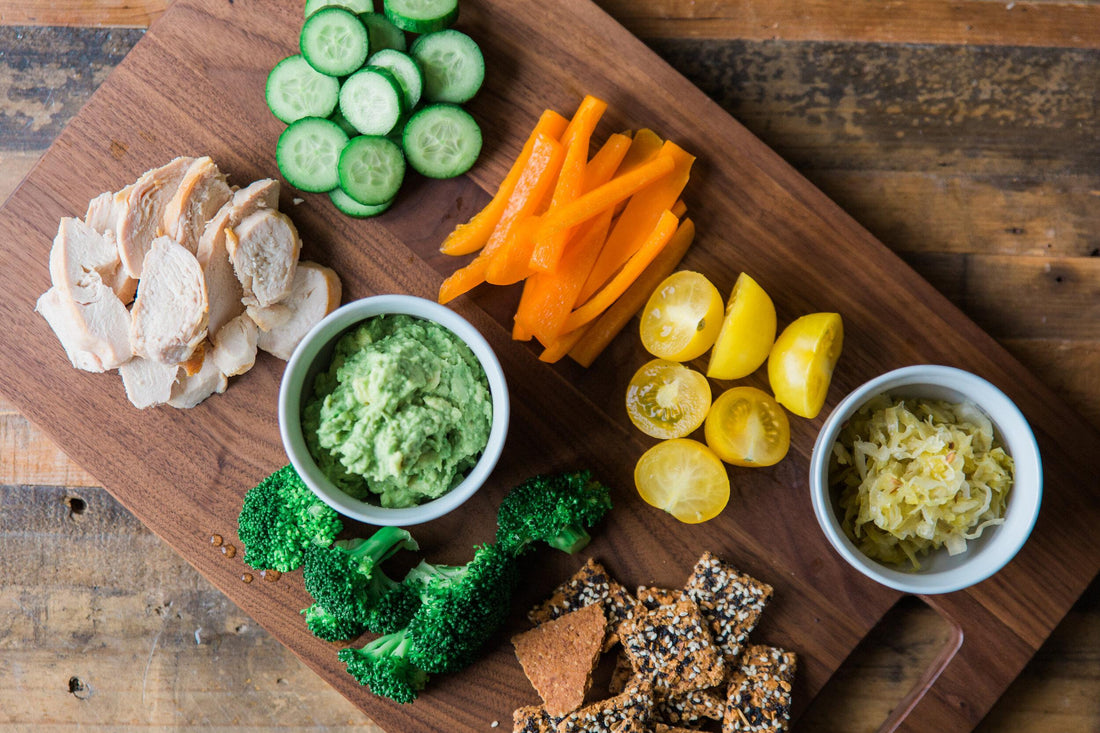
The latest endocrine science tells us that eating every three or four hours actually sets us up for not only exhaustion and premature aging, but also less fat burning. Why? When you eat, you begin the six-hour process of digestion, which requires your body to expend a lot of time and energy to break down food into molecules that can be absorbed and utilized. This process includes "the storage hormone" insulin that can last in the bloodstream for 6 to 8 hours post-release preventing fat breakdown.
Fab Four meals turn off hunger hormones, squelch inflammation, and provide the body with the perfect complete meal of essential nutrients. The Fab Four is the light structure for eating healthy without “eat" or "do not eat" lists. Simply look at your plate and ask yourself, "Do I have all four components?" Protein ups collagen, muscle tone, and metabolism; fat benefits hormones, skin, and cellular health; fiber promotes gut microbiome proliferation and detoxification; and greens (or veggies deep in color) provide cancer and inflammation-fighting phytonutrients. This combination is a fail safe to stop fighting not to eat and instead mix their nutrients and easily go 4-6 hours without thinking of food or snacking on processed foods.
Hunger vs Appetite
We’re driven to eat by hunger, a physiological impulse hard-wired into our brains and bodies. When we consume foods that are a healthy balance of essential fatty acids, amino acids, fibrous vegetables, and greens, our brains tell our bodies that we are sated and we stop eating. Our bodies then begin the multi-hour process of digestion and absorption.
If these food sources are clean and nutrient-dense, without added ingredients that the body doesn’t need, our bodies naturally use up the energy supplied by the food through our daily physical and mental activities and sleep. However, if we consume addictive foods that are high in sugar or simple carbohydrates, then our brain signals to our body that it is still hungry and we are driven to eat more food, this is food driven appetite. These processed foods release loads of the reward hormone dopamine in our brain making them highly addictive and craving-worthy when we are stressed, too.
Don’t be afraid of fat!
High-quality fats support our immune system, help our bodies absorb fat-soluble vitamins like A, D, K and E, improve cognitive function, build cell membranes and help balance hormones, it really is the key to anti-aging. Not to mention, it's the only macronutrient that never causes the release of the fat storage hormone insulin.
Your skin will thank you.
Healthy skin requires hydrating Omega 3 fatty acids, B vitamins for collagen and elastin production and trace minerals for repair, protection, and cell regeneration. Incorporate leafy greens and fiber to help proliferate healthy gut bacteria and wild fish rich in omega 3’s, vitamin D and B vitamins; sardines are my favorite.
When it comes to anti-aging tools, your mind probably goes straight to sun protection and serums. Skincare can certainly be powerful in the world of anti-aging (you can read all about my own skincare routine and recommendations here), but there’s another essential tool in your kitchen. How and what you eat greatly impacts how your entire body ages on a cellular level. Both the Fab Four and intermittent fasting are simple and effective ways to naturally support your body’s anti-aging functions.
A lot of nutrition recommendations revolve around the idea you should be eating small meals every three to four hours to keep your metabolism burning. However, the latest endocrine science tells us that eating this way actually sets you up for exhaustion, less fat burning, and premature aging. Why? When you eat, you begin the six-hour process of digestion, which requires your body to expend a lot of time and energy to break down food into molecules that can be absorbed and utilized. This process includes "the storage hormone" insulin that can last in the bloodstream for 6 to 8 hours post-release, preventing fat breakdown.
The more time your body spends digesting, the less time it’s able to devote solely to rejuvenating processes like cellular repair, autophagy (in which damaged cells are removed), antioxidant production, cognitive maintenance, hormone balancing, and decreasing levels of inflammation. Intermittent fasting lets your body take advantage of these processes and maximize their anti-aging effects.
Intermittent fasting involves eating all your meals within a specific timeframe and going without food, or fasting, for the remainder of the day. This allows your body longer periods of time without the work of digestion (remember, that’s a six-hour process) so it can focus on its other duties. Not to mention, as insulin drops off after your last meal, your body will begin running on stored fat - this is the fat-burning zone we so often crave!
I recommend eating the Fab Four - protein, fat, fiber, and greens - at all your meals to turn off hunger hormones like insulin, squelch inflammation, and provide the body with the perfect complete meal of essential nutrients to support all its functions including the ones related to anti-aging. Protein ups collagen, muscle tone, and metabolism; fat benefits hormones, skin, and cellular health; fiber promotes gut microbiome proliferation and detoxification; and greens (or veggies deep in color) provide cancer and inflammation-fighting phytonutrients. Whether you’re fasting or not, this combination is a fail safe to stop fighting not to eat and instead mix their nutrients and easily go 4-6 hours without thinking of food or snacking on processed foods, which often further contribute to inflammation.
If you’re wary of intermittent fasting, rest assured you don’t have to go an entire day without eating! I like to use what I call Circadian Synced Intermittent Fasting for myself and my clients. To put it simply, eat when it’s light out and stop eating when the sun goes down. Aligning your eating patterns with your circadian rhythm will further support its natural functioning and make transitioning into intermittent fasting easier for you. You can shorten your eating window further as you feel comfortable, maybe to a six or eight hour period. You’ll still be eating the same amount of nutrients to fuel your body. This is not a calorie restriction method, rather it’s a way to support your body so that it works well and is able to rest and repair itself naturally.
Once again, this is not an all or nothing approach. It’s important to do what’s right for your body and gradually introduce changes like this so that they can become part of your lifestyle rather than a short-lived practice. I recently spoke with an expert in intermittent fasting, Dr. Amy Shah, about how to incorporate intermittent fasting well. Check it out and see if intermittent fasting is right for you.
Article inspired and originally published in W Magazine: Why Intermittent Fasting is the Ultimate Anti-Aging Diet






